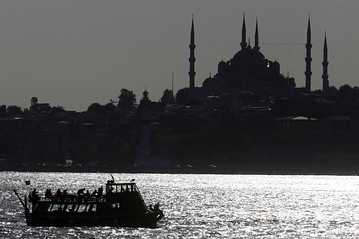Terribly Misleading Economist Article on PKK Terror–Please Leave Your Comments
ykundupoglu [[email protected]]
Turkey and the Kurds
Terror in the mountains
Oct 16th 2008 | ANKARA, DIYARBAKIR AND KARS
From The Economist print edition
Renewed violence raises new questions about Turkey’s treatment of its Kurds
HER boots caked in cow dung, her hands in soil, 80-year-old Xaje Artuget has but one regret. “I wish all eight of my sons had gone to fight in the mountains,” she sighs. In fact, “only one” joined the Kurdistan Workers’ Party (PKK) and is now “somewhere in northern Iraq”. Similar feelings abound in many hardscrabble townships in eastern Turkey, where decades of repression and poverty have provided a steady stream of recruits since the PKK launched its violent campaign for independence in 1984.
At least 44,000 people, mostly Kurds, have died in the conflict. The Turkish government says it has spent some $300 billion battling the terrorists. The results have been mixed. The PKK leader, Abdullah Ocalan, was captured in 1999, and several ceasefires followed. Yet the violence continues today—17 Turkish soldiers were killed in early October when some 400 PKK rebels raided a military outpost in Hakkari province, near the Iraqi border, and days later rebels killed four policemen in Diyarbakir. Sympathy for the PKK remains strong among Turkey’s 14m Kurds.
The Turkish parliament has now extended the army’s mandate to bomb PKK targets in Kurdish-controlled northern Iraq, and Turkish aircraft have been doing just that. Yet the latest wave of PKK attacks has embarrassed the ruling Justice and Development Party (AKP) and raised new questions about the army’s competence. The cries of incompetence grew louder when Taraf, a newspaper, published a leaked internal report showing that the army knew about the planned attack in Hakkari but did little to stop it. It did not help when the air-force chief was photographed playing golf a day later.
In an alarming twist, ethnic tensions are erupting in western parts of Turkey as well. Two people died in the town of Altinova recently when a Kurdish youth rammed a truck into a group of Turks who were taunting Kurds by playing loud nationalist tunes. The army was called in when Kurdish homes and businesses came under siege.
The Kurds remain a huge problem for Turkey’s government. The prime minister, Recep Tayyip Erdogan, raised hopes in 2005 when he said the state had “made mistakes” in handling them. Steps to ease bans on Kurdish broadcasting and education followed, and vast sums were poured into Kurdish regions. The handouts included education subsidies for the poor, especially for girls. These helped the AKP to clobber the pro-Kurdish Democratic Society Party (DTP) in much of the south-east in the July 2007 election. Yet to many the measures smell of vote-buying. “I haven’t received a penny for my girls’ schooling since April,” complains Sabiha Celik in Sason. “I will never vote for the AKP again.”
Indeed, Kurdish support for the AKP has been fading ever since the government yielded to army pressure to resume cross-border operations against the PKK in northern Iraq. The generals are baying for a freer hand, prompting worries of a return to the human-rights abuses of the 1990s. Ominously, the Turkish Human Rights Foundation says that, this year alone, over 30 people have been killed in alleged police violence, mostly in the Kurdish region. The government had to apologise when Engin Ceber, a left-wing activist, was tortured and beaten to death by security forces recently in an Istanbul prison.
AKP leaders, who narrowly escaped a constitutional court ban in July, have yet to utter a word about a similar closure case that is pending against the DTP on the ground that it is propagating separatism. DTP deputies spend lots of time lobbying for better prison conditions for Mr Ocalan. Many of them were handpicked by the PKK to run for parliament. Yet just as in the AKP case, much of the prosecution’s argument rests on words rather than deeds. Moreover, any ban might just boost the DTP’s popularity.
Turkey blames some of its Kurdish woes on the West. “We are still seeing co-operation with the PKK, they are doing fund-raising in EU countries and there are many PKK terrorists living in Europe. This really bothers us,” Ali Babacan, the foreign minister, claimed in an interview with The Economist. Similar harangues at the Americans have subsided since they agreed to let the Turks pursue the PKK in Iraq.
There are some hopeful signs that Turkey is trying to make friends with the Iraqi Kurds. This week Turkish diplomats met Masoud Barzani, who heads the Kurdish regional government in Iraq. This has prompted speculation that Turkey could be thinking of reviving an amnesty for PKK fighters untainted by violence. As the winter cold sets in, many might be tempted. And, as Mr Babacan acknowledges, “a military solution is not a solution.”
Back to top ^^




